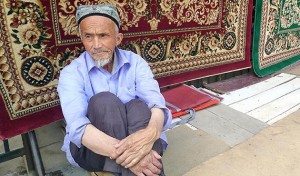HRW in favor of Turkey giving home to Uighur
World Bulletin, 28 November 2014
 World Bulletin/News Desk – Human Rights Watch has applauded a request by Turkey to have a group of Uighur discovered in a Thai border camp in March relocated to Ankara, highlighting the country’s role in providing them with consular services.
World Bulletin/News Desk – Human Rights Watch has applauded a request by Turkey to have a group of Uighur discovered in a Thai border camp in March relocated to Ankara, highlighting the country’s role in providing them with consular services.
Turkey’s Foreign Minister Mevlut Cavusoglu said Wednesday that he had brought the issue to the notice of Thai and Chinese foreign ministers, telling them “Turkey wants to shelter those Uighur.”
Uighur live primarily in the Xinjiang Uighur Autonomous Region in China, where they are officially recognized as one of the 56 ethnic minorities.
Phil Robertson, the deputy director of the organization’s Asia Division, told The Anadolu Agency on Thursday that the organization believed they should be allowed the freedom to go.
“Since the government of Turkey has stated they are prepared to receive them, it’s hard for us to understand why Thailand doesn’t just allow this group to be repatriated to Turkey,” he said.
He added that even though HRW had not been permitted access to the group, it understood that they have stated they are from Turkey and wish to return there.
The group was discovered by Thai immigration police in a southern rubber plantation in March and subsequently declared illegal immigrants. They claimed to be Turkish nationals, but it had long been suspected that they were actually Uighur.
World Uighur Congress Vice President Seyit Tumturk, however, told AA on Thursday that he had met with members of the group in Thailand and that they had told him they were all Turkish, not Chinese, and that all of them spoke Turkish.
“We need to prevent the extradition of these people to China in order for them to survive,” he said.
He underlined that Uighur are exposed to torture and oppression in China – purely because they want to fulfill their religious beliefs.
“They… should be sent to Turkey or to another safe country,” Tumturk said. “Otherwise they will be shot or tortured and killed.”
Robertson told AA that China’s consul general in Songkhla has spoken publicly about the situation and claimed that the group “is Uighur” and must be sent back to China.
Back in March, Ahmet Akay, the deputy chief of mission from the Turkish Embassy in Bangkok, told AA in Songkhla that he had been sent to help with their identification.
“I have been instructed to establish their identity. My findings will be passed to my headquarters. They don’t have documentations, as far as I know,” he told AA.
Robertson underlined Turkey’s role in reaching out and providing consular services to the group, saying that it had been “very effective.”
“The fact that they have not moved yet is not the fault of Turkey,” he added.
In the months following their discovery, authorities had separated the women and children from the men and started a nationality verification process. Of the women and children, 169 were placed in a government run social shelter in Songkhla, while the men were detained at several immigration police jails.
“The men have been held in immigration detention, which is hot, dirty, and cramped,” said Robertson. “Obviously, they are not at all happy to be held in those conditions.”
Of the 169 women and children placed in the social shelter, 137 have subsequently escaped.
Robertson underlined Thursday that nothing had been heard of the group since, pouring scorn on a Thai notion that they had been trafficked to a third country.
“We’ve heard nothing further about this group. However, we don’t believe the Thai allegations that they were taken away by traffickers. Obviously, they escaped from the Ministry of Social Development and Human Security shelters because they wanted to.”
Outside of China’s Xinjiang Uighur Autonomous Region, smaller communities of Uighur exist in Germany, Belgium, the Netherlands, Norway, Sweden, Russia, Afghanistan, Pakistan, Saudi Arabia, Canada, the United States, and Turkey.
Human rights organizations, activists and analysts have said that they have been subject to religious, cultural and language restrictions, which have led them to flee China and helped fuel their demands for a separate state.
They have frequently fallen victim to people smugglers as they seek a better life.

